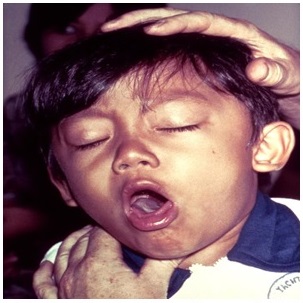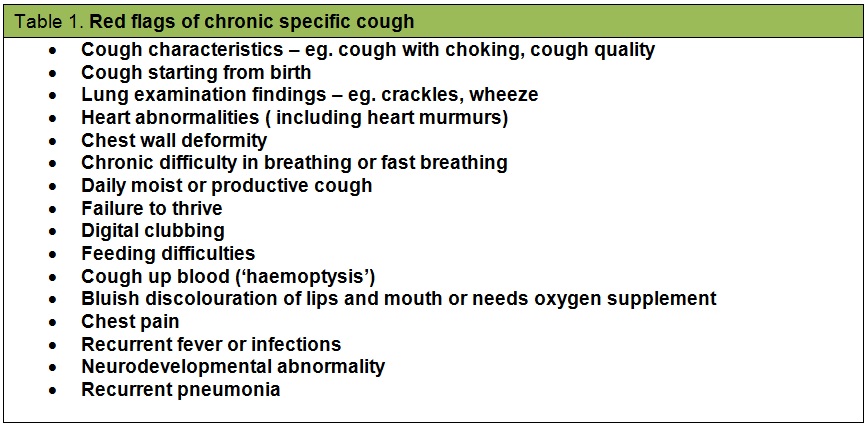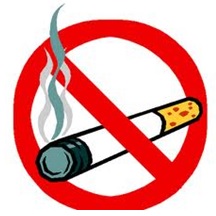Introduction
- Prolonged (chronic) cough is a common problem in children.
- Cough arises from any causes involving upper airways (nose, throat) and/or lower airways (windpipe and lungs).
- Even though viral infections of the airways and lungs are the most common cause, the other rarer causes of prolonged cough need to be excluded.
- Chronic productive cough with purulent phlegm production always needs further evaluation to exclude potentially serious illnesses or treatable causes.
- Chronic cough in children are different with chronic cough in adults in many different ways.

Source: http://en.wikipedia.org/wiki/cough
Definition of chronic cough
- Generally, chronic cough in children is defined as cough lasting longer than eight weeks.
- The eight week definition identifies those who need further investigations.
- This time frame is used because most viral infective causes of cough will resolve in 1- 3 weeks.
- Before investigating further.
- However, if the cough is not improving by the third week or is increasing in severity, earlier investigations are needed.
Classification of chronic cough
- There are many ways to classify chronic cough.
- It can be defined based on causes (specific and non-specific), duration, age of the child or cough characteristic (wet or dry, brassy etc).
- Generally, it is simpler to classify chronic cough in children into specific and non-specific cough, with an overlap.
- ‘Non-specific’ cough – refers to chronic dry cough without any abnormal pointers (table 1) in history and physical examination.
- Majority is likely due to post-infectious or post-viral cough and/or cough receptor hypersensitivity.
- Others include recurrent viral infections, pertussis-like illnesses, and psychogenic cough.
- ‘Specific’ cough – refers to cough in the presence of pointers/red flags (table 1) which suggest underlying causes.
- ‘Non-specific’ cough – refers to chronic dry cough without any abnormal pointers (table 1) in history and physical examination.

Common causes of childhood specific chronic cough
- The common causes of chronic specific cough in children includes:
- Bronchial asthma (link to asthma)
- Protracted Bacterial Bronchitis (PBB)
- Upper Airway Cough Syndrome (postnasal drips)
- Gastroesophageal Reflux Disease (GERD)
- Tuberculosis (link to berculosis)
- Other less frequent causes are as follows
- Suppurative lung diseases (eg. Bronchiectasis)
- Bronchiolitis obliterans
- Whooping cough (pertussis)
- Recurrent aspiration pneumonia
- Immunodeficiencies
- Airway anatomical abnormalities eg.tracheobronchomalacia
- Cystic fibrosis
- Cardiac abnormalities
Assessment and management of chronic cough
- Any child with chronic cough should be seen by a doctor for a thorough evaluation.
- Appropriate relevant investigations will be performed as indicated.
- The extent of investigations should be based on clinical setting, population examined, and available expertise.
What are the investigations for chronic cough?
- Normally your doctor will order a chest radiograph and lung function test (spirometry) in older children.
- Further investigations will depend on clues of specific pathology.
- Your doctor may check your child’s phlegm for microscopic examination and culture to many pathogens.
- If your child has contact with Tuberculosis (TB) patients, TB work-up will be carried out.
- Allergy skin testing or blood test for specific allergic testing (RAST) if atopy/asthma are likely diagnoses.
- Your doctor may take your blood for immune work-up or HIV testing if your child has recurrent chest infections or failing to thrive.
- Special tests like Chest HRCT (High-Resolution Computed Tomography), 24-hour pH study, Barium swallow, Bronchoscopy etc may be done if indicated.
How do we treat children with chronic cough?
- The specific treatment will depend on the identifiable causes. Discuss with your doctor accordingly.
- Exposure to cigarette smoke should be removed whenever possible.

- For post-viral cough or cough reflex hypersensitivity, it is advisable to adopt wait and see approach. Parents are assured that majority will resolve spontaneously. The children should be follow-up for emergence of specific etiologic pointers.
- Cough suppressants and other cold medications are not advisable especially in young children because of potential serious side-effects.
- If cough-variant asthma is a possibility, a trial of anti-asthma therapy may be used (e.g. inhaled corticosteroids). If cough does not resolve during medication trial within expected response time (eg. minimum 4 weeks), the medications will be discontinued. Your doctor then will consider other diagnoses.
References:
- Chang AB et al. Guidelines for Evaluating Chronic Cough in Pediatrics: ACCP Evidenced-based Clinical Practice Guidelines. Chest 2006;129:260S-283S.
- Chang AB. Cough: Are children really different to adults. Cough 2005, 1:7
- De Jongste JC et al. Chronic cough in children. Thorax 2003,58:998-1003.
| Last Reviewed | : | 28 June 2016 |
| Writer | : | Dr. Ahmad Rustam b. Zainuddin |
| Accreditor | : | Dr. Norzila bt. Mohamed Zainudin |







